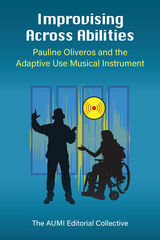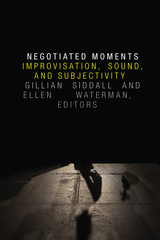2 books by Waterman, Ellen

Improvising Across Abilities
Pauline Oliveros and the Adaptive Use Musical Instrument
The AUMI Editorial Collective
University of Michigan Press, 2024
Improvising Across Abilities: Pauline Oliveros and the Adaptive Use Musical Instrument (AUMI) brings together scholars, musicians, and family members of people with disabilities to collectively recount years of personal experiences, research, and perspectives on the societal and community impact of inclusive musical improvisation. One of the lesser-known projects of composer, improviser, and humanitarian, Pauline Oliveros (1932–2016), the AUMI was designed as a liberating and affordable alternative to the constraints of instruments created only for normative bodies, thus opening a doorway for people of all ages, genders, abilities, races, and socioeconomic backgrounds to access artistic practice with others. More than a book about AUMI, this book is an invitation to readers to use AUMI in their own communities.
This book, which contains wisdom from many who have been affected by their work with the instrument and the people who use it, is a representation of how music and extemporized performance have touched the lives and minds of scholars and families alike. Not only has AUMI provided the opportunity to grow in listening to others who may speak differently (or not at all), but it has been used as an avenue for a diverse set of people to build friendships with others whom they may have never otherwise even glanced at in the street. By providing a space for every person who comes across AUMI to perform, listen, improvise, and collaborate, the continuing development of this instrument contributes to a world in which every person is heard, welcomed, and celebrated.
This book, which contains wisdom from many who have been affected by their work with the instrument and the people who use it, is a representation of how music and extemporized performance have touched the lives and minds of scholars and families alike. Not only has AUMI provided the opportunity to grow in listening to others who may speak differently (or not at all), but it has been used as an avenue for a diverse set of people to build friendships with others whom they may have never otherwise even glanced at in the street. By providing a space for every person who comes across AUMI to perform, listen, improvise, and collaborate, the continuing development of this instrument contributes to a world in which every person is heard, welcomed, and celebrated.
[more]

Negotiated Moments
Improvisation, Sound, and Subjectivity
Gillian Siddall and Ellen Waterman, editors
Duke University Press, 2016
The contributors to Negotiated Moments explore how subjectivity is formed and expressed through musical improvisation, tracing the ways the transmission and reception of sound occur within and between bodies in real and virtual time and across memory, history, and space. They place the gendered, sexed, raced, classed, disabled, and technologized body at the center of critical improvisation studies and move beyond the field's tendency toward celebrating improvisation's utopian and democratic ideals by highlighting the improvisation of marginalized subjects. Rejecting a singular theory of improvisational agency, the contributors show how improvisation helps people gain hard-won and highly contingent agency. Essays include analyses of the role of the body and technology in performance, improvisation's ability to disrupt power relations, Pauline Oliveros's ideas about listening, flautist Nicole Mitchell's compositions based on Octavia Butler's science fiction, and an interview with Judith Butler about the relationship between her work and improvisation. The contributors' close attention to improvisation provides a touchstone for examining subjectivities and offers ways to hear the full spectrum of ideas that sound out from and resonate within and across bodies.
Contributors. George Blake, David Borgo, Judith Butler, Rebecca Caines, Louise Campbell, Illa Carrillo Rodríguez, Berenice Corti, Andrew Raffo Dewar, Nina Eidsheim, Tomie Hahn, Jaclyn Heyen, Christine Sun Kim, Catherine Lee, Andra McCartney, Tracy McMullen, Kevin McNeilly, Leaf Miller, Jovana Milovic, François Mouillot, Pauline Oliveros, Jason Robinson, Neil Rolnick, Simon Rose, Gillian Siddall, Julie Dawn Smith, Jesse Stewart, Clara Tomaz, Sherrie Tucker, Lindsay Vogt, Zachary Wallmark, Ellen Waterman, David Whalen, Pete Williams, Deborah Wong, Mandy-Suzanne Wong
[more]
READERS
Browse our collection.
PUBLISHERS
See BiblioVault's publisher services.
STUDENT SERVICES
Files for college accessibility offices.
UChicago Accessibility Resources
home | accessibility | search | about | contact us
BiblioVault ® 2001 - 2024
The University of Chicago Press









